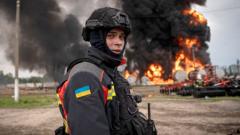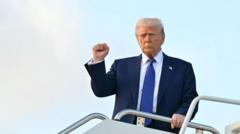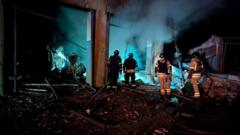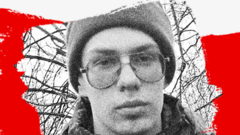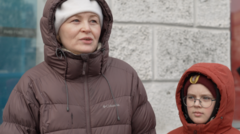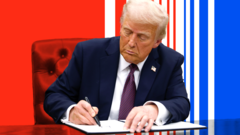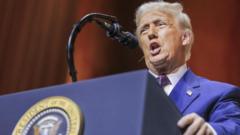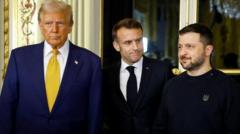An examination of the shifting geopolitical landscape shows Ukraine grappling with the impacts of Trump's diplomatic overtures and how they echo fears reminiscent of the war's early days.
**Return of Ukraine’s Existential Crisis Amid Resurgence of Trump’s Diplomacy**
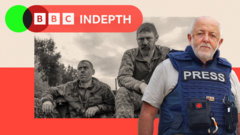
**Return of Ukraine’s Existential Crisis Amid Resurgence of Trump’s Diplomacy**
Amidst the calm in Kyiv, Ukraine's fear of extinction resurfaces as Trump's rhetoric gives credence to Russian aggression.
In Kyiv, a seemingly peaceful city is grappling with renewed terror as former President Donald Trump’s return to the political spotlight stirs anxiety about the future of Ukrainian sovereignty.
The bustling streets of Kyiv stand as a stark contrast to the wartime desolation seen three years ago, with shops open and traffic jams replacing the sound of gunfire. However, recent developments have reignited fears about Ukraine's national survival, particularly since the phone call on February 12, 2023, between Trump and Russia’s Vladimir Putin, which has been characterized as a troubling political embrace. During his presidency, Trump frequently undermined Ukraine's fight against Russia, often propagating narratives aligning with the Kremlin, including labeling Ukrainian President Volodymyr Zelensky as a dictator unworthy of negotiation.
Trump's approach suggests a willingness to concede ground to Russia even before negotiations commence. In his recent public statements, Trump has claimed that Ukraine will not join NATO and has appeared to tacitly endorse Russian territorial gains, contrary to international norms established after the invasion. Such behavior is perplexing to many Ukrainians who had perceived the United States as a strong ally against their aggressor.
In the face of growing pressure from Trump, senior adviser Ihor Brusylo acknowledged Ukraine’s determination to preserve its sovereignty, emphasizing their identity as a European nation. Despite the overture of normalcy in Kyiv, the specter of war looms larger than ever, with nightly air raid alarms reminding residents of the ongoing conflict.
Reflections on the past highlight that after the chaotic early months of the war and subsequent Russian withdrawals from Kyiv, the landscape has evolved yet remains fraught with peril. In the frontline areas, destruction reigns, with fierce fighting and a humanitarian crisis unfolding. Ukrainian military figures express confidence in protecting their territory against Russian advances, despite the stark realities of war.
The hardships of battle are now deeply imprinted in the psyche of Ukraine’s youth, as recalled by young recruits like Maxsym Lutsyk and Dmytro Kisilenko, who have grown into the roles of soldiers amid the conflict. Their narratives highlight how the war has transformed their lives, a transformation that parallels broader reflections on Europe’s past dealings with aggressors.
Meanwhile, Trump’s unpredictability raises concerns among European allies regarding the diplomatic landscape and future committed support for Ukraine. His transactional approach to foreign policy casts doubt on the long-term commitment to uphold the security of non-American nations, exacerbating anxiety within Ukraine and its allies.
As the possibility of a detrimental peace deal looms, the war-torn realities on the ground contrast with political dialogues. Ukrainian soldiers continue preparing for combat, and the palpable resilience among the populace signifies a steadfast resolve not to allow concessions that could compromise their independence.
Trump's stance is perceived by many in Ukraine as reminiscent of historical precedents where aggressors were appeased, raising fears of a repeat of Czechoslovakia's capitulation in 1938. The ongoing discourse underscores the responsibility of global leaders to recognize the profound stakes involved, as the struggle for Ukraine's sovereignty continues amid the chaos of diplomacy.
The bustling streets of Kyiv stand as a stark contrast to the wartime desolation seen three years ago, with shops open and traffic jams replacing the sound of gunfire. However, recent developments have reignited fears about Ukraine's national survival, particularly since the phone call on February 12, 2023, between Trump and Russia’s Vladimir Putin, which has been characterized as a troubling political embrace. During his presidency, Trump frequently undermined Ukraine's fight against Russia, often propagating narratives aligning with the Kremlin, including labeling Ukrainian President Volodymyr Zelensky as a dictator unworthy of negotiation.
Trump's approach suggests a willingness to concede ground to Russia even before negotiations commence. In his recent public statements, Trump has claimed that Ukraine will not join NATO and has appeared to tacitly endorse Russian territorial gains, contrary to international norms established after the invasion. Such behavior is perplexing to many Ukrainians who had perceived the United States as a strong ally against their aggressor.
In the face of growing pressure from Trump, senior adviser Ihor Brusylo acknowledged Ukraine’s determination to preserve its sovereignty, emphasizing their identity as a European nation. Despite the overture of normalcy in Kyiv, the specter of war looms larger than ever, with nightly air raid alarms reminding residents of the ongoing conflict.
Reflections on the past highlight that after the chaotic early months of the war and subsequent Russian withdrawals from Kyiv, the landscape has evolved yet remains fraught with peril. In the frontline areas, destruction reigns, with fierce fighting and a humanitarian crisis unfolding. Ukrainian military figures express confidence in protecting their territory against Russian advances, despite the stark realities of war.
The hardships of battle are now deeply imprinted in the psyche of Ukraine’s youth, as recalled by young recruits like Maxsym Lutsyk and Dmytro Kisilenko, who have grown into the roles of soldiers amid the conflict. Their narratives highlight how the war has transformed their lives, a transformation that parallels broader reflections on Europe’s past dealings with aggressors.
Meanwhile, Trump’s unpredictability raises concerns among European allies regarding the diplomatic landscape and future committed support for Ukraine. His transactional approach to foreign policy casts doubt on the long-term commitment to uphold the security of non-American nations, exacerbating anxiety within Ukraine and its allies.
As the possibility of a detrimental peace deal looms, the war-torn realities on the ground contrast with political dialogues. Ukrainian soldiers continue preparing for combat, and the palpable resilience among the populace signifies a steadfast resolve not to allow concessions that could compromise their independence.
Trump's stance is perceived by many in Ukraine as reminiscent of historical precedents where aggressors were appeased, raising fears of a repeat of Czechoslovakia's capitulation in 1938. The ongoing discourse underscores the responsibility of global leaders to recognize the profound stakes involved, as the struggle for Ukraine's sovereignty continues amid the chaos of diplomacy.




